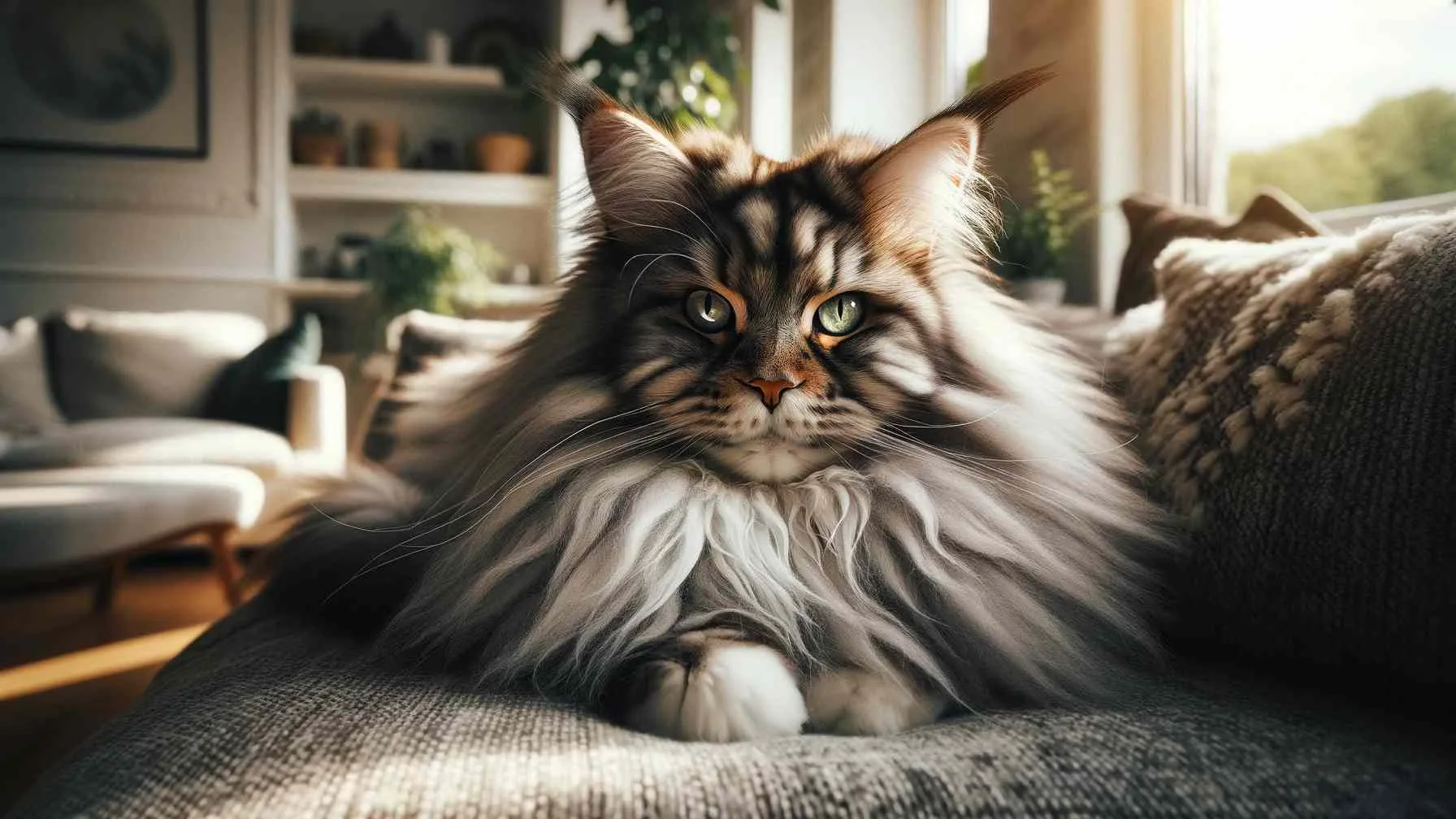If you’re considering adopting a Maine Coon cat or already have one as a furry companion, you may be wondering if they are prone to snout allergies. Maine Coon cats are generally not more prone to snout allergies than other breeds of cats, but they can still develop allergies that affect their snouts. It’s important to be aware of the signs and symptoms of snout allergies in Maine Coon cats so that you can provide them with the best care and treatment. In this blog post, we will explore the potential for Maine Coon cats to develop snout allergies, common allergens that may affect them, and how to manage and treat these allergies to ensure the health and well-being of your beloved feline friend.
Key Takeaways:
- Maine Coon cats may not be prone to snout allergies specifically, but they can develop allergies to various environmental and food factors.
- It is important to monitor your Maine Coon cat for any signs of allergic reactions like sneezing, coughing, or skin irritation, and consult a veterinarian if necessary.
- Regular grooming, a clean living environment, and a controlled diet can help minimize the risk of allergies for Maine Coon cats.
Understanding Snout Allergies
Even if you don’t have a Maine Coon cat, it’s important to understand snout allergies and how they can affect your feline friend. If you want to learn more about how Maine Coon cats may affect allergies, check out this informative article called Do Maine Coon Cats Affect Allergies?
Basics of Feline Allergies
Feline allergies can be caused by a variety of factors, including environmental irritants, food allergies, and genetic predisposition. Your cat may exhibit symptoms such as sneezing, itching, and watery eyes. Some cats may also develop skin rashes and sores due to allergies. It’s important to monitor your cat for any unusual behavior or symptoms that could indicate an allergic reaction.
Symptoms and Causes of Snout Allergies
Snout allergies in Maine Coon cats can be particularly troublesome. Your cat may develop symptoms such as red, inflamed snout, excessive sneezing, and breathing difficulties. These symptoms can be caused by a variety of allergens, including pollen, dust, and certain foods. Identifying the specific cause of your cat’s snout allergies is crucial for effectively managing their condition. In severe cases, snout allergies can lead to respiratory issues and discomfort for your cat.
By understanding the basics of feline allergies and recognizing the symptoms and causes of snout allergies, you can take proactive steps to ensure the health and well-being of your Maine Coon cat. Remember, it’s always best to consult with a veterinarian if you have any concerns about your cat’s health. Being proactive in managing your cat’s allergies can help prevent potential complications and ensure a healthy, happy life for your beloved pet.
Maine Coon Cats and Allergy Susceptibility
Obviously, if you’re considering bringing a Maine Coon cat into your home, you may have heard about their potential susceptibility to allergies. It’s important to understand the genetic predispositions and common allergens that affect Maine Coon cats, so that you can provide the best care for your feline friend.
Genetic Predispositions
Maine Coon cats are not inherently more prone to allergies than other cat breeds, but certain genetic factors can make them more susceptible. For example, some Maine Coon cats may have a genetic predisposition to skin allergies, which can result in itching, hair loss, and skin lesions. Additionally, these cats can be more sensitive to environmental allergens, such as dust mites, pollen, and mold. It’s important to be aware of these potential genetic factors when considering the care and maintenance of your Maine Coon cat.
Common Allergens for Maine Coon Cats
As a Maine Coon cat owner, it’s important to be aware of the common allergens that may affect your pet. Dust mites, pollen, mold, and certain food ingredients are among the most common allergens that can impact Maine Coon cats. Allergies to these substances can manifest in skin irritation, respiratory issues, and digestive discomfort. It’s essential to monitor your cat and watch for any signs of allergic reaction, so that you can take appropriate measures to minimize exposure to these allergens.
Remember to keep an eye out for any signs of allergic reactions in your Maine Coon cat, and consult with a veterinarian if you have any concerns about your cat’s health. It’s important to provide a clean and safe environment, as well as a balanced diet, to minimize the risk of allergies for your beloved pet.
Diagnosis and Treatment
Now that you are aware of the common allergies that Maine Coon Cats can be prone to, it’s important to understand how these allergies are diagnosed and treated. To learn more about the various allergies that your Maine Coon Cat might be susceptible to, you can refer to 12 Common Maine Coon Cat Allergies.
Professional Assessment of Allergies
When it comes to diagnosing allergies in your Maine Coon Cat, it’s crucial to seek a professional assessment from a veterinarian. A vet will be able to perform allergy testing, such as skin or blood tests, to determine the specific allergens that are triggering reactions in your cat. By identifying the allergens, you can take proactive measures to minimize your cat’s exposure to them.
Managing Allergies in Maine Coon Cats
If your Maine Coon Cat is diagnosed with allergies, it’s important to take proactive steps to manage their condition. This may include avoiding exposure to known allergens, using allergy-friendly grooming products for your cat, and implementing dietary changes if food allergies are suspected. Your vet may also recommend allergy medication or immunotherapy to help alleviate your cat’s symptoms and improve their quality of life.
Preventative Measures and Care
Your Maine Coon’s snout allergies can be managed with a few preventative measures and care. It’s important to be mindful of their environment as well as their diet. If you want to learn more about how to handle common Maine Coon food allergies, you can find helpful information here.
Environmental Adjustments
Ensuring your home environment is clean and free from potential allergens is crucial for helping your Maine Coon avoid snout allergies. Regular cleaning and dusting, along with using air purifiers, can greatly reduce the presence of allergens in the air. Additionally, washing your cat’s bedding and toys frequently can help minimize the risk of allergic reactions.
Best Practices for Owners
As a responsible owner, it’s important to pay close attention to your Maine Coon’s behavior and any signs of snout allergies. If you notice any symptoms such as sneezing, itchiness, or discharge from the nose, it’s essential to consult with a vet promptly. Being proactive and seeking professional help early on can prevent the condition from worsening. Furthermore, providing a balanced diet and proper grooming can help keep your Maine Coon healthy, reducing the likelihood of snout allergies.
Are Maine Coon Cats Prone To Snout Allergies?
With these considerations in mind, you can confidently navigate your Maine Coon cat’s health and be aware of potential snout allergies. While Maine Coons may not be inherently prone to snout allergies, it is still important to monitor their symptoms and seek veterinary advice if you notice any unusual behavior or symptoms. Remember to keep their living environment clean and free of potential allergens, and to provide them with a balanced diet to support their overall health and well-being. By staying informed and proactive, you can ensure that your Maine Coon cat leads a happy and healthy life free from snout allergies.
Maine Coon Cat Allergies FAQ
Q: Are Maine Coon cats prone to snout allergies?
A: Maine Coon cats can be prone to allergies, including those affecting their snouts. Common snout allergies seen in Maine Coons include dust, pollen, and certain food allergies.
Q: What are the symptoms of snout allergies in Maine Coon cats?
A: Symptoms of snout allergies in Maine Coon cats may include sneezing, itching, redness, swelling, and discharge from the nose. Some cats may also paw at their snouts or exhibit signs of discomfort.
Q: How can I help alleviate snout allergies in my Maine Coon cat?
A: To help alleviate snout allergies in Maine Coon cats, you can ensure a clean and dust-free environment, regularly groom your cat to remove pollen and other allergens from their fur, and consult with a veterinarian about potential dietary changes to address food allergies.
Q: Can Maine Coon cats develop chronic snout allergies?
A: Yes, Maine Coon cats can develop chronic snout allergies if not properly managed. Chronic allergies can lead to ongoing discomfort and may require long-term management and treatment by a veterinarian.
Q: When should I seek veterinary care for snout allergies in my Maine Coon cat?
A: If you notice persistent or severe symptoms of snout allergies in your Maine Coon cat, such as difficulty breathing, excessive sneezing, or visible signs of distress, it is important to seek veterinary care promptly. A veterinarian can diagnose the specific allergy and recommend an appropriate treatment plan.


